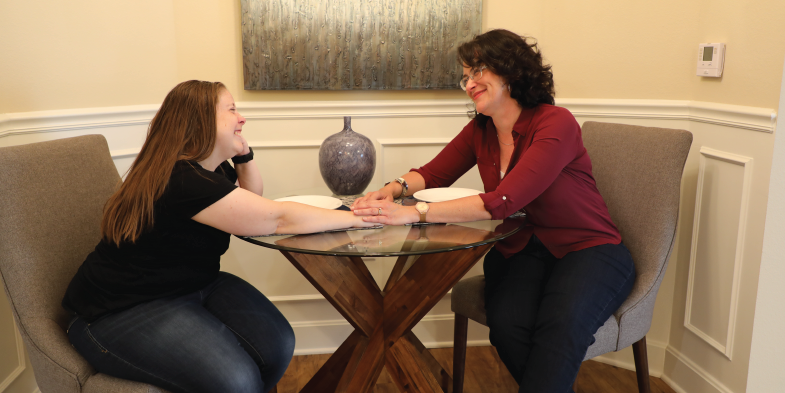The year was 1974 when six sets of parents, the founders of GoodLife, started meeting together in a living room in Johnson County, Kansas. The aftermath of the Civil Rights Movement swirled around them, and great progress had been won for the freedom and equality of black people in America. Change in public education was happening, too. For the first time, public schools in Kansas were mandated to open their doors to individuals with intellectual and developmental disabilities (I/DD). Around the country, families began building a strong movement to deinstitutionalize services for people with I/DD. At the time, over 200,000 adults and children were living in institutions-2,000 in Kansas alone. Parents wanted to bring their children with special needs closer to home and into their community for a more purposeful, connected and empowered life. It’s this vision that remains GoodLife’s focus today, over 40 years later.
Marilyn Hammond was one of the parents meeting in Johnson County. Her son David, 11, was born with cerebral palsy and intellectual disabilities. His needs were becoming too great for Marilyn to handle on her own anymore: he needed to be dressed, carried and fed, and had health issues that required 24-hour care by a professional. The other five families were in the same situation – they had sons and daughters with I/DD and were passionate about giving them what didn’t yet exist: an inclusive, connected life.
“We were all anxious to bring our children home from large institutions,” says Marilyn Hammond. “We wanted to keep them nearby in a small environment, either at home or, if that wasn’t possible due to their needs, close enough to visit.”
Since no community living homes existed for people with I/DD, the parents decided they’d build their own. But first, they were required by the Johnson County Commissioner to establish a need in the county before they would receive funding assistance.
Faced with what seemed like an impossible task, the parents hit the streets and the phones to survey their community. “I packed up my three kids and the dog into my unairconditioned car in the dead of summer,” Marilyn laughs. “I drove around Johnson County knocking on doors and talking to people. It was the only way we knew how to do it.” After nearly a year of their grassroots efforts, the group hit their goal: a 3% need for community living services in Johnson County.
It was now 1977. Fueled by the knowledge that there was a legitimate need for community living, the parents formed their own organization, Community Living Opportunities (CLO). For the next five years, CLO fought hard to gain funding, county approvals and community support to break ground on the shared vision for their children. In 1983, we opened our first single-family, inclusive-living neighborhood home, Conser House. The early dreams of 12 parents in a living room in Johnson County had finally come true, and David and the other children moved in.
It was clear to CLO that the I/DD needs in the community far outweighed Conser House’s capacity. In 1984, we opened our second home, Marty Lane. By 1988, we were serving 55 adults in seven different homes.
CLO residents had access to a center for therapy, group activities and support services. They were connected to community services like occupational and physical therapy, doctors, recreation centers and movie theatres, all activities that weren’t provided in large institutions.
“The wonderful thing was not only having our sons and daughters with us in the community, but they gained an inclusive, close-knit living arrangement,” shares Marilyn. “For the first time, we were able to prove that we could serve people with I/DD in a more humanizing way for less cost than institutions.”
The rest, they say, is history.
In the coming years, CLO led the closure of several large institutions, and helped the State of Kansas to build the capacity of existing providers and create new service providers to support the great majority of individuals moving from these institutions. We remain one of the few private agencies in Kansas specializing in serving people with severe developmental disabilities.
In a 40-year collaboration with the Department of Applied Behavioral Science at the University of Kansas, we pioneered inclusive service models and offer enriching community-focused programs that better and more cost-effectively meet the needs of our residents through small and specialized homes located within single-family neighborhoods. These models include the Neighborhood Network, the Family Teaching Model, the Professional Family Teaching Model, and other dynamic programs.
In 2017, CLO expanded our mission to serve all individuals with barriers to independent living, including those with traumatic brain injuries or other mental/behavioral needs, and seniors under the new parent company GoodLife Innovations, Inc.
GoodLife’s vision is to redefine what’s possible for supporting people to live independent, satisfying and purposeful lives. Our mission is to make a meaningful difference in the everyday lives of seniors, individuals with disabilities, and those who support them by transforming lives through deep relationships, learning, respect, innovation, exceeding expectations and achieving results.
“From day one, GoodLife has shown great strength in our model for community living. We have become a leader in the implementation of innovative, enriching, and highly effective services,” says Marilyn, now a GoodLife board member. “Never in my wildest dreams did I imagine we’d build something this big that helps so many people like my son, David. And today, with programs like Midnight Farm that truly empower residents, it just keeps getting better.”


